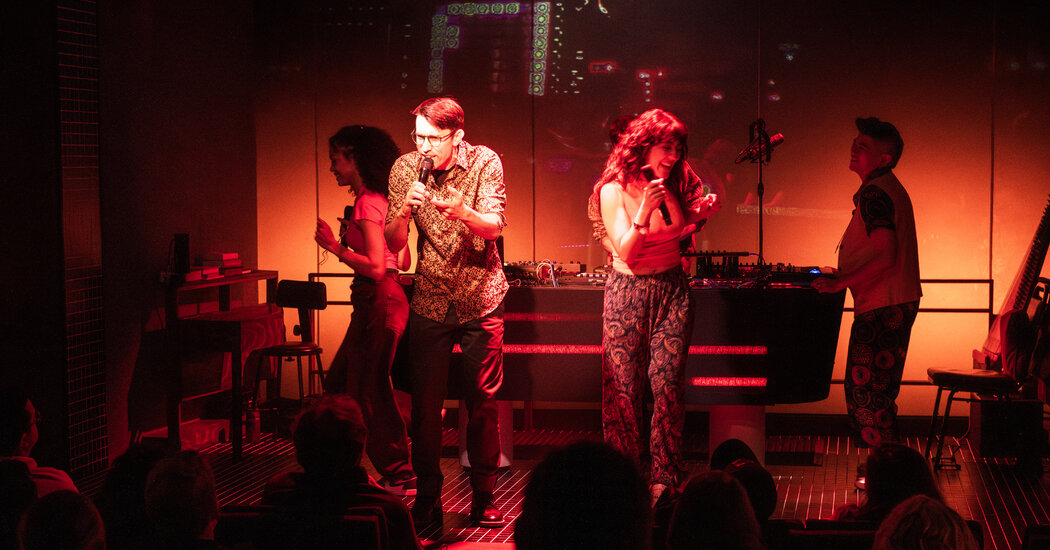Some ride-share passengers are content to wear headphones and gaze out the window. But anywhere that James Harrison Monaco goes, including the back seat of a Lyft, presents an opportunity to zero in on someone else’s story.
In the first segment of “Travels,” Monaco’s new autobiographical show that opened at Ars Nova in Manhattan on Monday, the playwright and performer tells the audience that he was itching to talk on a recent ride from the Los Angeles airport when the driver handed him an audio cable so he could put on music, opening the door to conversation. Their exchange, Monaco says breathlessly, peeled off like a speeding car.
Monaco’s dogged curiosity, and affinity for electronic beats, propels much of this uneven 90-minute show, for which he also composed the Miami Beach-meets-Berlin underscore. Monaco’s opening anecdote, the first in a series of eight, introduces the sense of possibility he feels when he is in transit, the inquisitiveness he brings to bear on others and his amorphous concept of music as a medium for storytelling.
Eager and bespectacled, Monaco is the first-person voice in each account, but he shares narrating duties with three performers — El Beh, Ashley De La Rosa and Mehry Eslaminia — who take turns recalling his encounters with a handful of people he’s found fascinating over the past several years, both at home and abroad. This layering effect in the performances is echoed in the backbeats and crescendos that a head-bobbing Monaco generates, in collaboration with the instrumentalist John Murchison, from behind an onstage table full of D.J. equipment (the set is by Diggle).
Considering how often Monaco draws attention to his called-off marriage engagement, it would not be unfair to categorize “Travels” as a breakup album. (The project is also a departure for Monaco from his artistic partnership with Jerome Ellis, who contributed additional music.) Reeling from heartache, Monaco seems to search for meaning and solace in the far graver misfortunes of a friend referred to as “R,” a political prisoner turned asylum seeker and the show’s most revisited subject.
“Perhaps all pain is comparable in the end,” Monaco recalls R telling him of their wholly incomparable struggles.
That dissonance is also evidenced in the way Monaco pairs music and language, not with the scansion of a songwriter but with the urgent insistence of someone who has a lot to say. (Monaco is also a translator, and some passages are spoken in Spanish with English supertitles.) A consistent, mid-tempo pulse signals intensity and momentum, and Murchison plays beautifully on string instruments with origins in the Middle East (Monaco shares credit on orchestrations and arrangements with Or Matias; sound design is by Nick Kourtides). But the score’s lack of variation feels like a missed opportunity, as with a stop at a reggaeton club oddly devoid of reggaeton’s distinctive punch.
Passages rendered in talk-singing also suffer from maintaining a fixed register, despite the dexterity that De La Rosa and Eslaminia, in particular, bring to that uneasy endeavor.
The director Andrew Scoville’s production has a maximalist ’90s aesthetic that tends toward overstimulation: projections by Stefania Bulbarella that recall graphic Trapper Keepers, pattern-rich costumes by Sarita Fellow and party lighting by Jeanette Oi-Suk Yew awash in pinks, blues and yellows. It’s a fun, immersive vehicle for a journey more about restlessness than about any particular destination.
The tightly controlled experience of “Travels” can feel both illuminating and unnerving: stories you might absorb at your own pace if not for the unrelenting beats; music you might groove along to if not for the flurry of words. Enjoyment may depend on what type of passenger you tend to be.
Travels
Through April 20 at Ars Nova, Manhattan; arsnovanyc.com. Running time: 1 hour 30 minutes.


